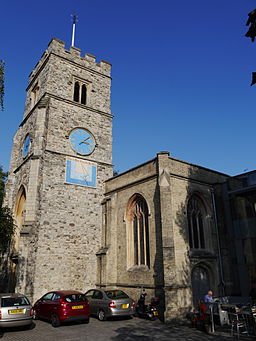 |
| St Mary's Church, Putney. The final resting place of John Toland. Edwardx [CC BY-SA 3.0], via Wikimedia Commons |
His journey began on the remote, Gaelic-speaking peninsula of Inishowen, in Ireland's most northerly county of Donegal. He was educated at the universities of Glasgow, Edinburgh, Leiden and Oxford but, living Dublin when his first major work, an incendiary pamphlet that went by the title of Christianity not Mysterious, appeared in print in 1696. The pamphlet was first published anonymously however, Toland admitted authorship the following year.
The furore that enveloped led to three copies of the book being burned in Dublin by the public hangman, at the instigation of the Irish parliament. If Toland had not fled to England, where he found sanctuary among various radicals and reformers operating there, he would have been burned alive along with the copies.
Thereafter, he resided for the greater part of his life in England, mostly in and around London however, he was also a frequent visitor to the continent. He died in Putney, where he had taken lodgings with a carpenter, Edward Hinton, in 1718. It is here that he wrote most of his later works, including Pantheisticon.
 |
| Scan from the burial register of St Mary', Putney – see 15th March, 1721 (Julian calendar). Our thanks to Thomas Brunkard for supplying this image. |
Parish records from the Church of St. Mary the Virgin in Putney tell us that his remains were "decently interred in the church-yard" on 13 March 1722. (see British History Online)
Elsewhere, it is mentioned that, at the time of his death, he left a legacy amounted to about 150 manuscripts, piled high on two chairs. Shortly after his death, a biography by Pierre des Maizeaux, an exiled French Huguenot writer, appeared along with a collection of his works that ran to two volumes.

No comments:
Post a Comment